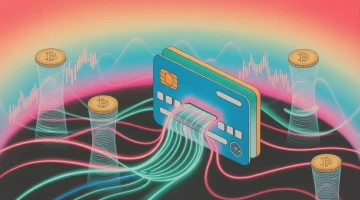Exploring Blockchain Game Development Opportunities in 2024

Table of contents:
The intersection of blockchain technology and the gaming industry has given rise to a revolutionary concept known as GameFi development. This innovative approach merges the principles of blockchain with gaming, opening up a plethora of opportunities for developers and players alike. But what exactly is blockchain game development, and why is it creating such a buzz in the gaming world? Let's delve deeper into this exciting topic.
What is Blockchain Game Development?
Blockchain game development, or GameFi development, refers to the integration of blockchain technology into the gaming ecosystem. Unlike traditional games that operate on centralized servers, blockchain games leverage decentralized networks to provide a more transparent, secure, and immersive gaming experience. By integrating elements such as non-fungible tokens (NFTs), decentralized finance (DeFi), and play-to-earn mechanics, GameFi is changing how games are created, played, and monetized.
Core Principles of Blockchain Game Development
1. Decentralization: Blockchain games run on decentralized networks, eliminating the need for centralized authorities to control gameplay, asset ownership, and in-game economies. This decentralization fosters greater transparency, fairness, and autonomy for players.
2. Tokenization: Through the use of NFTs, blockchain games enable true ownership of in-game assets. Players can trade digital items securely on blockchain-based marketplaces, thereby unlocking new revenue streams and fostering a vibrant in-game economy.
3. Play-to-Earn Mechanics: GameFi development introduces play-to-earn mechanics, allowing players to earn real-world rewards for their time and skill invested in the game. By completing tasks, achieving milestones, or participating in in-game activities, players can earn cryptocurrency rewards or valuable digital assets.
4. Interoperability: Blockchain technology facilitates interoperability between different games and platforms, enabling seamless asset transfer and cross-game compatibility. Players can use their acquired assets across multiple games, enhancing the overall gaming experience and fostering a sense of ownership and continuity.
Blockchain Game Development Market Overview in 2024
The Web3 industry really took off in Q1 2024. According to DappRadar, there was a big jump in the number of daily unique active wallets (dUAW), up to 7.7 million. That's a 77% increase from the previous quarter. This upward trend was also seen in the blockchain gaming sector, which ended the quarter with an impressive 2.1 million dUAW, representing a solid 59% increase compared to the previous period. What's more, blockchain gaming is still a big part of the Web3 industry, with 30% of the total Unique Active Wallets.
Top Gaming Blockchains by Average dUAW
Blockchains play a pivotal role in game development by providing a decentralized and transparent infrastructure for creating, playing, and monetizing games. Variants of blockchains differ in their consensus mechanisms, scalability, and transaction costs. Choosing the best blockchain for game development depends on factors such as the desired level of decentralization, transaction speed, and cost-effectiveness for the specific game project. Developers must carefully evaluate these factors to select the most suitable blockchain variant for their game development needs.
Here is a list of top gaming blockchains by dUAW:
- Polygon – 1.2 M
- Ronin – 695k
- Solana – 677k
- BNB Chain – 642k
- SKALE – 632k
Gaming Token Performance
According to Big Blockchain Game Report, during Q1, several newer gaming tokens achieved their all-time highs, including Parallel Studios’ PRIME token, the BEAM token (a reissued version of Merit Circle’s MC token), and Ronin’s RON token, originally launched in 2022. Surprisingly, among tokens within the top 200 cryptos ranking, the best performer was Yield Guild Gaming’s YGG token, introduced in 2021 during the Axie Infinity boom. Its recent surge in value can be attributed to its migration to the Ronin blockchain, offering increased liquidity and significantly lower transaction fees compared to its previous availability on Ethereum.
Top Blockchain Games
When it comes to on-chain game activity during Q1 2024, the clear winner was browser-based social RPG Pixels. It was originally launched on the Polygon blockchain, but then relaunched in November 2023 on the Sky Mavis’ Ronin chain, and it found immediate success. In fact, because of the decline of Alien Worlds and Splinterlands, Pixels has been the most popular blockchain game in terms of its daily active unique wallets since December.

Key Trends in Blockchain Game Development
Key Web3 gaming trends encompass various innovative approaches reshaping the gaming landscape in 2024.
Different Incentive Structures
Quest-to-Earn, Learn-to-Earn, Move-to-Earn, Compete-to-Earn, Trade-to-Earn, and other incentive structures are actively evolving, providing players with diverse opportunities to earn rewards within blockchain games. These structures incentivize various actions and behaviors, encouraging engagement and participation while offering tangible rewards in the form of tokens or digital assets.
Play-to-Airdrop
The rise of the Play-to-Airdrop trend in Q1 2024 has complemented the existing Play-to-Earn model in blockchain gaming. This trend rewards players with tokens for their social media engagement and interaction with games, further incentivizing participation and fostering community building. By integrating direct rewards into game mechanics, the Play-to-Airdrop model enhances players' gaming experiences while promoting broader adoption and activity across blockchain networks.
Metaverse Integration
Metaverse integration has become increasingly prevalent in blockchain game development, blurring the boundaries between virtual and physical realities. Through metaverse integration, players can experience immersive, interconnected virtual worlds where they can socialize, collaborate, and engage in various activities, driving the evolution of gaming towards a more interconnected and expansive digital universe.
NFT Integration
The integration of non-fungible tokens has revolutionized ownership and monetization in blockchain gaming. NFT developmentallows the creation, ownership, and transfer of unique digital assets within games, empowering players to truly own their in-game items and assets. Developers can leverage NFTs to create scarce, tradable digital collectibles, enabling new revenue streams, fostering player-driven economies, and enhancing player engagement and retention.
These key trends in blockchain game development exemplify the dynamic and innovative nature of the industry, driving forward the adoption and evolution of blockchain technology in gaming while reshaping player experiences and interactions within virtual worlds.
Business Benefits of Blockchain Game Development
Blockchain technology has emerged as a powerful tool, offering a multitude of benefits for both developers and players. Let's explore the business benefits of embracing blockchain technology in game development.
Enhanced Security and Transparency
Blockchain technology's inherent properties, such as decentralization and immutability, provide enhanced security and transparency for gaming ecosystems. By storing game data and transactions on a decentralized ledger, developers can mitigate the risk of fraud, cheating, and data manipulation. This increased security not only protects players' assets and identities but also builds trust and confidence in the gaming platform, attracting more users and driving user retention.
New Revenue Streams through Tokenization
Tokenization lies at the heart of blockchain game development, enabling the creation, ownership, and exchange of digital assets within games. By tokenizing in-game items, characters, and virtual goods as NFTs, developers can introduce new revenue streams through token sales, auctions, and in-game purchases. Moreover, players can trade these digital assets on blockchain-based marketplaces, creating vibrant player-driven economies and fostering a secondary market for virtual goods.
Access to Global Markets and Decentralized Communities
Blockchain technology transcends geographical boundaries, providing access to a global audience of players and enthusiasts. By leveraging decentralized platforms and networks, developers can reach players from diverse backgrounds and regions, expanding their market reach and driving user acquisition. Furthermore, blockchain-based games often foster decentralized communities of players, developers, and enthusiasts, who collaborate, contribute, and co-create within the ecosystem, fostering a sense of ownership and belonging.
Player Engagement and Retention
Blockchain game development introduces innovative gameplay mechanics, such as play-to-earn incentives, NFT-based rewards, and decentralized governance, which promote player engagement and retention. Through play-to-earn models, players can earn cryptocurrency rewards or valuable digital assets by participating in in-game activities, completing tasks, or achieving milestones. This gamification of rewards incentivizes continued gameplay, drives user engagement, and enhances player loyalty over time.
Integration of DeFi Features
Blockchain game development opens up opportunities for integrating decentralized finance features, such as staking, lending, and yield farming, within gaming ecosystems. By incorporating DeFi protocols and smart contracts, developers can offer players financial incentives, liquidity pools, and investment opportunities within the game environment. These DeFi features not only enrich the gaming experience but also provide players with avenues to generate passive income and grow their digital wealth.
Embracing blockchain technology gives developers and businesses a way to innovate, monetize, and grow in the ever-changing gaming industry. As more and more companies start using blockchain technology in their games, those who are quick to embrace it will be the ones who benefit the most.
Blockchain Game Development Genres
Blockchain game development has brought a whole new level of creativity and innovation, offering a wide range of genres that cater to all kinds of gaming preferences and interests. Blockchain games cover a lot of ground, from strategy and role-playing games to collectibles and virtual worlds. Each genre has its own set of mechanics, gameplay dynamics, and monetization models. Let's take a closer look at the main types of blockchain games and see what makes them different.
Strategy Games
Strategy games challenge players to use tactical thinking, resource management, and strategic decision-making to outwit their opponents or overcome obstacles. In the realm of blockchain gaming development, strategy games often incorporate elements of blockchain-based economies, allowing players to build and manage virtual kingdoms, civilizations, or armies while leveraging blockchain technology for asset ownership and trading.
Role-Playing Games (RPGs)
Role-playing games immerse players in rich, narrative-driven experiences where they assume the roles of fictional characters and embark on epic quests, adventures, or journeys. In blockchain RPGs, players can customize their characters, level up their abilities, and participate in quests or battles within decentralized virtual worlds. Blockchain technology enhances RPGs by enabling true ownership of in-game assets, facilitating peer-to-peer trading, and introducing play-to-earn mechanics.
Collectible Games
Collectible games revolve around the acquisition, trading, and management of digital collectibles, often represented as NFTs on the blockchain. Players can collect rare items, cards, or characters, with each collectible possessing unique attributes, scarcity, and value. Blockchain collectible games leverage NFTs to ensure ownership authenticity, scarcity, and provenance, allowing players to trade their digital assets securely on blockchain-based marketplaces.
Virtual Worlds
Virtual worlds offer players immersive, open-ended environments where they can socialize, explore, and create within expansive digital realms. In blockchain virtual worlds, players can own and customize virtual land, build structures or establishments, and interact with other players in real-time. Blockchain technology underpins these virtual economies, enabling decentralized governance, land ownership verification, and player-driven economies where in-game activities can yield real-world value.
Sports and Racing Games
Sports and racing games simulate real-world sporting events or competitive racing experiences, challenging players to showcase their skills and abilities in virtual competitions. In blockchain sports and racing games, players can collect, trade, and compete using blockchain-based assets, such as virtual sports cards or race cars. Blockchain technology ensures fairness, transparency, and traceability in competitive events, while also enabling tokenized rewards and incentives for players' achievements.
X-to-Earn Games
X-to-earn games encompass a variety of gameplay mechanics where players can earn rewards by engaging in specific activities or actions within the game. These activities may include moving, learning, socializing, or completing tasks, among others. In Move-to-Earn games, for example, players can earn rewards by physically moving or exercising, while Learn-to-Earn games incentivize learning and skill development. X-to-Earn mechanics leverage blockchain technology to tokenize player achievements and activities, providing tangible rewards that can be traded or redeemed within the game ecosystem.
Casino Games
Casino games simulate traditional casino experiences, offering players the thrill of gambling and chance-based gameplay. In blockchain casino games, players can enjoy a variety of popular casino games such as poker, blackjack, roulette, and slot machines, with the added benefits of transparency, fairness, and security provided by blockchain technology. Blockchain-based casinos use smart contracts to ensure transparent and provably fair gaming outcomes, while also enabling instant payouts and seamless transactions using cryptocurrencies. Players can enjoy the excitement of casino gaming while also benefiting from the trust and reliability of blockchain technology.
As the blockchain gaming industry continues to evolve, we can expect to see even more groundbreaking genres and experiences emerge, further enriching the gaming landscape for players worldwide. When choosing a genre for blockchain game development, developers should carefully weigh factors like target audience preferences, market demand, and the suitability of integrating blockchain features into gameplay mechanics. Understanding the distinct characteristics and player expectations of each genre is crucial for crafting captivating and immersive gaming experiences that appeal to both blockchain enthusiasts and mainstream gamers.
But it's important not to just go along with whatever's popular. If you're going to succeed in the competitive world of blockchain game development, you've got to be passionate about your creation and stay true to your creative vision. Ultimately, creating something you're passionate about will not only fuel your motivation but also resonate with players who appreciate authenticity and innovation.
Conclusion
When we look at the state of blockchain gaming in 2024, it's clear that the industry is full of promise and potential. Despite some initial financial hurdles, the dedication and innovation driving the creation of new games and advancements in technology signal an exciting trajectory ahead. In the next few years, we could see blockchain gaming become mainstream, offering experiences that go beyond what we can imagine today.
As the blockchain gaming industry continues to gain momentum and evolve, now is the perfect time to embark on blockchain game development. By embracing innovation, staying on top of market trends, and fostering a passion for creation, developers have the chance to shape the future of gaming and carve out a prominent role in the growing blockchain gaming ecosystem. So, seize the moment, take the leap, and join the ranks of trailblazers who are shaping the next chapter of blockchain gaming. Contact us today to discuss your blockchain idea!
We ❤️ Development
Follow us on social media to receive the hottest blockchain development updates
Twitter ⚡️Telegram⚡️LinkedIn⚡️Facebook












%201.webp)



